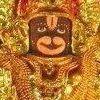Slave to excellence
Listening to a concert featuring Ravi Shankar and his daughter Anoushka in New York's Carnegie Hall, Anjali Sharma was lost in thought about her meteoric rise to fame
The legendary sitar player Ravi Shankar and his daughter Anoushka
recently performed at the Carnegie Hall and captivated the audience for
hours. He has been a pioneer in disseminating India's rich classical
music tradition in the West and he continues to set new standards for
young musicians.
Other known Indian musicians who performed were Tanmay Bose (tabla), Ravichandra Kulur (flute) and Kenjo (tanpura) from Japan.
The first half of the programme was conducted by Anoushka with Ektall
and Ada Chautal, accompanied by Bose, Kulur and Kenjo. The spotlight
shifted to the maestro in the second half. He was accompanied by
Anoushka on sitar, Bose on tabla and Kulur on flute. He performed the
raag Jogeshwari.
Anoushka, who was born in London, was inspired by her mother Sukanya
Shankar to play the sitar. At the age of eight she started taking
lessons on a custom-made sitar.
The 26-year-old has already released five albums, the latest being
Breathing Under Water, which features Sting and Norah Jones, her half
sister, as guest artistes. She collaborates with the dynamic
multi-instrumentalist Karsh Kale on a selection of songs that
effortlessly fuse the traditions of Indian music with cutting-edge
electronic sounds, rock, and much more, to create something original.
When the father-daughter duo take the stage, it's difficult to predict
what's in store for the audience. The elements of legacy and destiny
are important to her. She is equally respectful of both, but bound to
neither. Her ever-growing audience cannot help but acknowledge the
familial roots of the young woman coaxing spellbinding spiritual sounds
from her sitar, but neither can one deny that she is an innovator in
her own right. It is talent alone that keeps her going.
Anoushka has studied Indian classical music from the maestro and has,
over the years, built up a strong following. "The younger Shankar
revealed herself to be a remarkably promising sitarist," declared a
critic in New York's Time Out magazine in 1997 and a few years later
Dubai's Gulf News Panorama noted, "She has accomplished far more than
many musicians would do in a lifetime".
She made her recording debut at the age of 13 appearing on the album In
Celebration, a tribute to the works of Ravi Shankar. Two years later
she made her debut as conductor on her father's Chants of India,
produced by a close family friend, the late George Harrison.
Anoushka's 1998 solo debut, Anoushka, established the musician. "That
album is a lasting testament to my father's style and the beauty of
it," she says. That same year, the British Parliament awarded her with
a House of Commons Shield, making her both the youngest and the first
female recipient of the honour.
Anourag released in 2000, her sophomore effort, expanded upon and
refined what she had offered on her debut, while 2001's Live at
Carnegie Hall established her in the international arena, garnering her
a Grammy nomination.
She did not release any new recordings under her own name for the next
four years. In 2002 at the historic Concert for George, a tribute to
the late George Harrison in London, she conducted a new composition of
Ravi Shankar, Arpan, which featured a guitar solo by Eric Clapton. She
also performed Harrison's The Inner Light.
That same year she released her book ~ Bapi: The Love of my Life, an
intimate biographical portrait of her father's exceptional journey, as
well as a BBC-produced telecast documentary, Anoushka Shankar: Sitar
Trek, a 30-minute glimpse of life on the road with the emerging queen
of the sitar.
In 2004, she earned a best supporting actress nomination from India's
National Film Awards for her debut role in Dance Like a Man, a film by
the Delhi-based director Pamela Rooks. Also in 2004, leaving no doubt
that her impact was being felt around the world, she was chosen as one
of 20 Asian Heroes by the Asia edition of Time magazine.
In 2005 she released her fourth, and most ambitious, album, Rise (Angel
Records). Anoushka had recorded and performed primarily as a soloist,
interpreting the music of her father.
Anoushka loves performing in the Indian classical realm and continues
to work closely with her father and Rise was all about finding her
musical voice. On the album she fused notes from the East and West
using both acoustic and electric instrumentation. It received glowing
reviews everywhere and gave Anoushka another Grammy nomination in the
Best Contemporary World Music category.
She also became the first Indian to play at the Grammy Awards when she
performed a piece from the CD at the pre-telecast ceremony in February
2006. In August 2007 Anoushka's fifth record, Breathing Under Water,
was released to critical acclaim.
She expanded her vision as a producer, pianist, composer, and lyricist
with Breathing Under Water. The album is carefully constructed and
composed, boasting some of the finest guest artists on the order of her
father, Ravi Shankar, who created the nucleus of two climatic pieces
for the album, plus her good friend Sting and her sister, Norah Jones,
as well as some of the finest artists around today.
She toured US cities following the release of Breathing Under Water,
working with a band and expanding on the concepts she had brought to
the album.
Those who have witnessed her rise over the years are not surprised with the result. She was meant to be among the best.
http://www.thestatesman.net/page.news.php?clid=19&theme= &usrsess=1&id=175345















comment:
p_commentcount